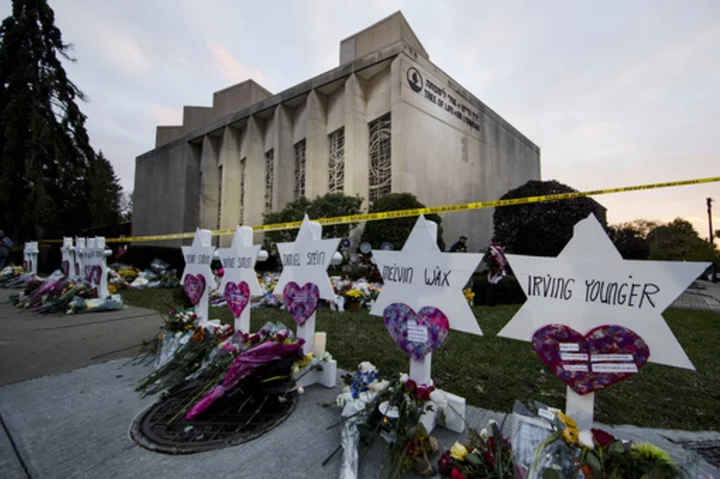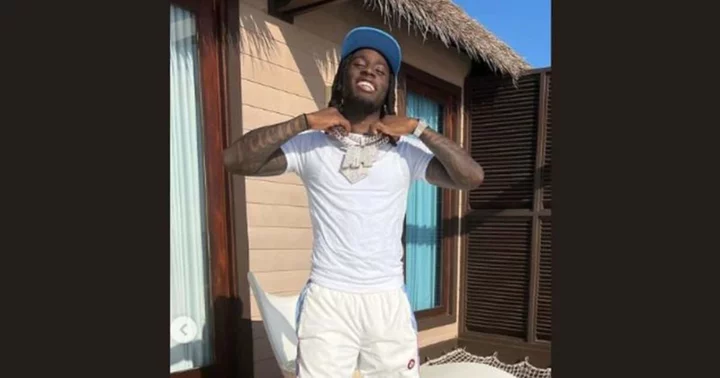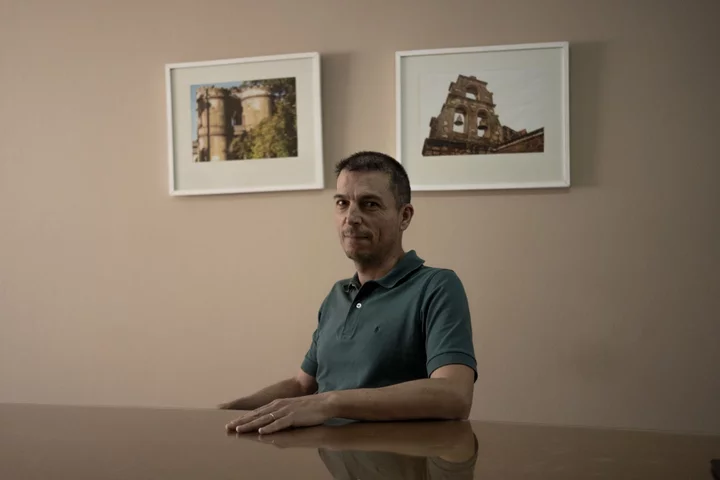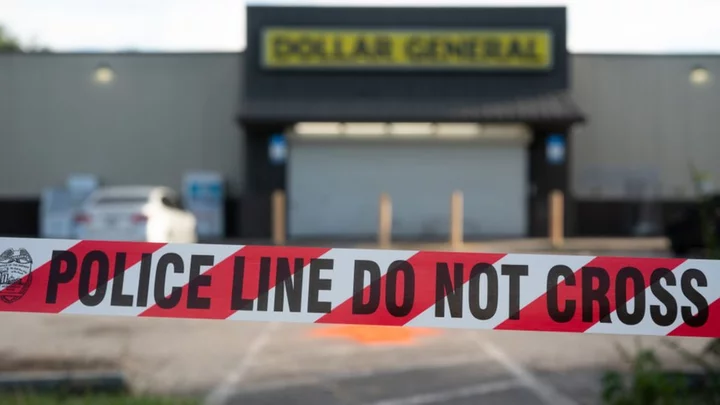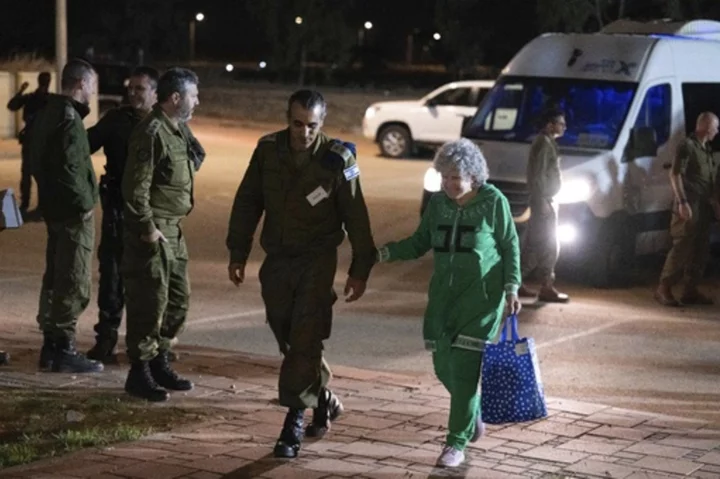PITTSBURGH (AP) — The gunman convicted in the deadliest antisemitic attack in U.S. history had psychotic, delusional and paranoid symptoms that made him unable to understand the world or make appropriate decisions, his lawyer said Monday, launching an effort to persuade jurors to spare his life.
Robert Bowers has had a psychotic condition since childhood, as well as serious brain defects and a history of suicide attempts, defense lawyer Michael Burt said on the opening day of the penalty phase of Bowers' federal trial. Bowers was convicted this month in the 2018 killings of 11 worshippers at a Pittsburgh synagogue. Prosecutors are seeking the death penalty.
The defense argues that Bowers was unable to form the requisite level of intent to allow the jury to impose a death sentence. Medical tests found Bowers’ brain to be “structurally deficient,” with symptoms of epilepsy and schizophrenia, Burt said.
Prosecutor Troy Rivetti, in his opening statement Monday, said the government was prepared to rebut any mental health defense.
Bowers clearly intended to kill everyone he could find in Pittsburgh's Tree of Life synagogue on Oct. 27, 2018, Rivetti said. He called the magnitude of Bowers' crimes staggering,
“He came to kill,” Rivetti said. “The defendant entered the Tree of Life synagogue, a sacred place to gather and pray, and he murdered 11 innocent worshippers.”
Bowers, flipping through papers, gave little indication that he was listening to the lawyers’ statements. He has shown little reaction throughout the trial.
Prosecutors rested their case Monday afternoon in the first stage of the penalty phase — proving that the case is eligible for the death penalty — and the defense is slated to begin calling witnesses Tuesday. The jury must decide if the case is eligible for the death penalty before hearing further evidence and arguments on whether to impose it.
The death penalty has become a prominent topic in the 2024 presidential race. The federal death penalty wasn’t a high-profile issue until former President Donald Trump’s administration resumed executions in 2020 after a 17-year hiatus. With 13 inmates put to death in his last months in office, Trump oversaw more federal executions than any president in more than 120 years.
President Joe Biden said during his 2020 campaign that he would work to end capital punishment at the federal level and in states, and Attorney General Merrick Garland has paused executions to review policies and procedures. But federal prosecutors continue to work to uphold already-issued death sentences and to pursue the death penalty for crimes that are eligible, as in Bowers’ case.
If jurors decide Bowers deserves to die, it would be the first federal death sentence imposed during Biden's presidency.
The first federal capital trial under Biden ended in March with jurors split on a death sentence, sparing the life of Islamic extremist Sayfullo Saipov for killing eight people in New York City.
Bowers, 50, a truck driver from suburban Baldwin, killed 11 members of three congregations — Dor Hadash, New Light and Tree of Life — who had gathered for Sabbath services in the heart of Pittsburgh's Jewish community. He also wounded two worshippers and five police officers.
The jury convicted Bowers on June 16, after five hours of deliberations, on all 63 counts he faced. The same jurors now must decide whether Bowers is eligible for the death penalty.
Prosecutors first have to show proof of intent and at least one aggravating factor that made the killings more heinous.
Rivetti told the jury Monday that many of Bowers' victims were frail and elderly. He displayed a photo of a cane left on a pew by Bernice Simon, who was shot and killed as she attempted to tend to her mortally wounded husband, both in their 80s.
The prosecutor also argued there was evidence of intent at every step of the attack.
Bowers raged against Jews online, fixating on a Jewish refugee-aid organization that he accused of bringing in “invaders.” He then drove half an hour from his apartment to the synagogue, his car loaded with weapons and ammunition, and made "decision after decision” to pull the trigger, Rivetti said.
From the beginning, Bowers' punishment — a death sentence or life in prison without parole — has been the only question in the case. His attorneys admitted he carried out the attack, offered only a token defense at trial, and have long signaled their focus would be on saving his life.
Before the trial, Bowers' attorneys offered a guilty plea in return for a life sentence, which prosecutors rejected. Most of the victims' relatives support seeking the death penalty.
The guilty verdict followed three weeks of wrenching survivor testimony and often graphic evidence, including victims' 911 calls and photographs of the carnage. Bowers' lead defense attorney, Judy Clarke, called no witnesses. She suggested Bowers was driven not by religious hatred but a deluded belief that by killing Jews, he was saving children from the genocide he believed was being perpetrated by immigrants aided by Jews.
On Monday, relatives of several victims gave poignant testimony about their loved ones' frailties, such as difficulty walking, hearing or a lack of situational awareness, as evidence to bolster the case that Bowers targeted the vulnerable — a potential aggravating factor.
Diane Rosenthal testified to the genetic developmental disabilities of her brothers, Cecil and David Rosenthal. They needed help dressing themselves and were distressed by loud noises, she said. Routine was important, and they always attended the Saturday service at Tree of Life.
“That was their comfort place, that was their safe place,” she said.
The sentencing phase of the trial was expected to last four to five weeks.
Assuming it finds Bowers is eligible for the death sentence, the jury will then hear victim impact statements demonstrating the trauma suffered by survivors and the victims' loved ones, as well as mitigating factors that might prompt a more lenient sentence, which may include pleas from his relatives.
To put him on death row, jurors will have to agree unanimously that the aggravating factors outweigh the mitigating ones.
Clarke has represented other killers in high-profile capital cases, including Boston Marathon bomber Dzhokhar Tsarnaev, who is appealing his death sentence, and 1996 Olympics bomber Eric Rudolph and the late Unabomber Ted Kaczynski, who both received life sentences.
___
Associated Press religion coverage receives support through the AP’s collaboration with The Conversation US, with funding from Lilly Endowment Inc. The AP is solely responsible for this content.

